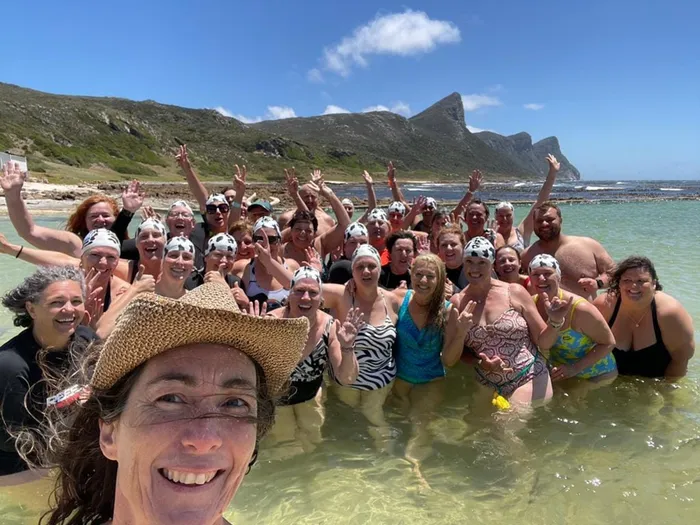Salty Ducks make a splash for a good cause

The Salty Ducks will take a dip in 10 tidal pools on Saturday November 25 to raise money for a project that teaches disadvantaged children to swim.
The Salty Ducks swim group will tackle a tidal pool challenge along the False Bay coastline on Saturday in aid of swimming lessons for disadvantaged children.
Proceeds from the event will support ARKYS Outreach: Project Neptune which teaches children how to swim as well as how to treasure their environment and heritage.
Last year, the Salty Ducks took dips in 10 tidal pools to raise funds for the CHOC Childhood Cancer Foundation (“Ducks take a dip to turn the tide against cancer,” Echo, November 24, 2022).
Salty Ducks member Sophie Marra said they had now decided to hold an annual fund-raiser.
Anyone can join by donating at least R50. The challenge will start at the St James tidal pool at 5am and is expected to end around noon at Cape Point.
The group has so far raised more than R14 000 of a R20 000 target through givengain.com
ARKYS Outreach Project Neptune coordinator Sally Sivewright said she started Guardians of the Deep, an environmental education company, in 2019, but due to the pandemic, she had to start a non-profit organisation, ARKYS Outreach, to raise funds for schools and businesses that could not afford environmental education.
Under its umbrella, ARKYS Outreach supports various community initiatives – one being Project Neptune, which has partnered with the Simon’s Town Museum, the National Sea Rescue Institute (NSRI), Kleinberg Primary School, Generation Schools Imhoff, and Guardians of the Deep.
Ms Sivewright said 25 children, mostly from Kleinberg Primary School, were enrolled in Project Neptune and children from other schools would be allowed to join in the new year.
The children are taught survival swimming in a heated pool at Generation Schools Imhoff every Saturday and training consists of two half-hour sessions followed by a snack and then an educational session on cultural preservation or environmental education.
Tazneem Wentzel, education officer at Simon’s Town Museum, which is a collaborative partner of Project Neptune said her father was involved in Learn to Swim, a programme run by Swimming South Africa, and she learned to swim at a young age.
“I’ve always loved swimming and I think it is important for children to learn how to swim and at the same time be educated about the ocean and their heritage.”
The programme, she said, focused on children from disadvantaged communities whose parents had been forcibly removed from coastal communities such as Simon’s Town, under the Group Areas Act, breaking their connection to the sea.
Many children in Ocean View could not swim and some feared the water, she said, as there was no pool in the area.
The NSRI Drowning Prevention Unit has three core drowning prevention programmes – water safety education, pink rescue buoys, and survival swimming. Survival swimming teaches children to control their breathing, orientate themselves in water, float, and propel themselves to safety for five metres or more.
Ms Wentzel is one of nine volunteer swimming coaches and completed NSRI’s survival swimming instructor’s course
“It has made me realise how much I love the water, and it’s a great opportunity to help children work through their many layers of fear to get them comfortable in the water,” she said.
Another volunteer coach and the only “drake” in the Salty Ducks, Tim Seel, has also done the survival swimming instructor’s course and said Project Neptune was a good way for him to give back to his community.
NSRI executive director of drowning Dr Jill Fortuin said: “All the instructors are volunteers and up to September 2 this year, Project Neptune completed 149 survival swimming lessons, and in South Africa thus far, the NSRI drowning prevention department has completed 17 336 survival swimming lessons.”
Kleinberg Primary School principal Denzil van Graan said: “Project Neptune has changed the lives of our children very much this year. Our pupils have been afforded the opportunity to learn to swim and be water-safe throughout the year. I have seen their eagerness and dedication to participate every Saturday morning.”
